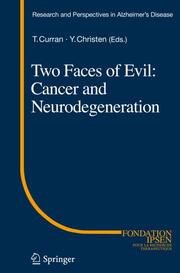-
Zusatztext
-
Homeostasis involves a delicate interplay between generative and degenerative processes to maintain a stable internal environment. In biological systems, equilibrium is established and controlled through a series of negative feedback mechanisms driven by a range of signal transduction processes. Failures in these complex communication pathways result in instability leading to disease. Cancer represents a state of imbalance caused by an excess of cell proliferation. In contrast, neurodegeneration is a consequence of excessive cell loss in the nervous system. Both of these disorders exhort profound tolls on humanity and they have been subject to a great deal of research designed to ameliorate this suffering. For the most part, the topics have been viewed as distinct and rarely do opportunities arise for transdisciplinary discussions among experts in both fields. However, cancer and neurodegeneration represent yin-yang counterpoints in the regulation of cell growth, and it is reasonable to hypothesize that key regulatory events mediated by oncogenes and tumor suppressor genes in cancer may also affect neurodegenerative processes
-
-
Kurztext
-
The two greatest medical fears of the aging population are cancer and Alzheimer's disease. Despite dramatic advances in understanding the molecular etiology of these disorders, therapeutic options for many patients with advanced disease have changed little and outcomes remain dismal. Paradoxically, recent findings suggest that some of the same molecules and biochemical processes underlying cancer may also participate in neurodegeneration. Therefore, it would be very useful to bring together experts from the fields of cancer research and neurodegeneration for discussions of the latest advances and ideas, with a particular emphasis on areas of overlap, to stimulate transdisciplinary interactions with the hope of accelerating progress. Cancer arises as a consequence of a breakdown in the genetic and epigenetic processes governing cell proliferation and cell death. Alterations in several classes of signaling molecules, both oncogenes and tumor suppressor genes, lead to uncontrolled cell growth. Over the past two decades, details of the intricate signaling pathways, from cell surface receptors through protein kinase cascades, transcription factors and modulators of chromatin, as well as the DNA damage response pathways linked to cell cycle control that guard the genome, have been uncovered. In some instances, key regulatory proteins have provided novel targets for development of small molecule inhibitors that are currently being tested in the clinic. The development of the nervous system relies on many of the signaling pathways and growth control processes that go awry in cancer. However, in mature neurons, the very same signaling proteins participate in transduction cascades linking short-term stimuli, elicited by synaptic stimulation, to long-term alterations in neuronal circuits through the regulation of gene expression and chromatin structure. These long-term adaptive modifications lead to changes in synaptic structure and function that contribute to learning and memory. The persistence of growth regulatory molecules in postmitotic neurons provides an opportunity for their contribution to pathophysiological processes resulting in neuronal loss. Recently, evidence has accumulated suggesting an association of cell cycle proteins and signal transduction proteins with neurodegeneration. Indeed, inhibitors of histone deacetylation have shown promise both as anti-cancer agents and in the prevention of neuronal loss
-
Detailansicht
Two Faces of Evil: Cancer and Neurodegeneration
Research and Perspectives in Alzheimer's Disease
ISBN/EAN: 9783642166013
Umbreit-Nr.: 1459729
Sprache:
Englisch
Umfang: xiv, 166 S., 2 s/w Illustr., 27 farbige Illustr.
Format in cm:
Einband:
gebundenes Buch
Erschienen am 07.04.2011
Auflage: 1/2011


